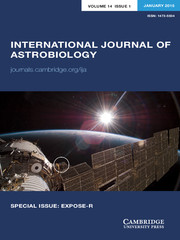Article contents
Moral challenges of going to Mars under the presence of non-intelligent life scenario
Published online by Cambridge University Press: 18 July 2019
Abstract
Much is discussed what would be the ideal position in terms of our ethical treatment with respect to other forms of life, particularly those that can be discovered in other worlds, in addition to our role in terms of the expansion of terrestrial life in the universe. This represents a great philosophical challenge, but what if we should make a moral decision in the face of the inevitable situation of being forced to colonize, for example, Mars? Is there a position in which we can feel safe to act legitimately? This paper tries to force us into a mental and conceptual exercise about what can really be worth beyond the concept or the positions we may have and analyse them in light of the practicality that decision making requires in this problem.
- Type
- Research Article
- Information
- Copyright
- Copyright © Cambridge University Press 2019
References
- 4
- Cited by


